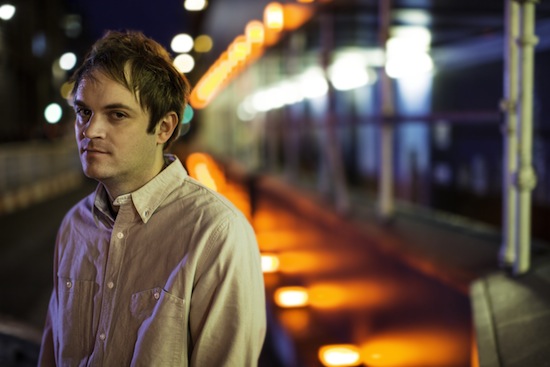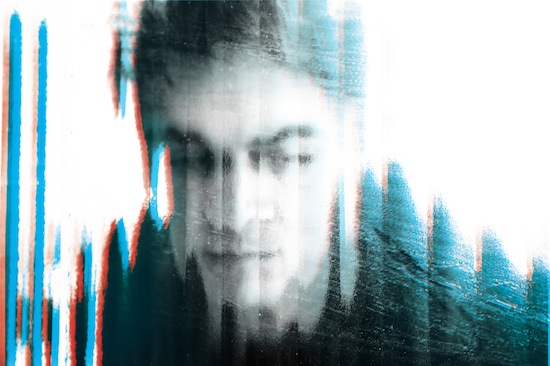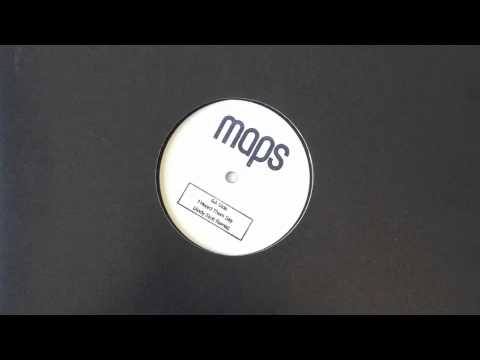Let’s begin with a shocking revelation – I had to look up the meaning of the title of Maps’ new album. According to the Oxford English Dictionary, Vicissitude means "a change of circumstances or fortune". A few days later, when I ask James Chapman – the man behind Maps – about the word in question, he informs me that he “uses it every day”. I give him my death stare. “Well, okay, I saw it in a book and then had a little Google,” he admits and I feel slightly less stupid.
Thankfully, the music that makes up Vicissitude is easier to understand. Chapman has crafted his best album to date – an effortless welding of skittering electronica to elegant pop songs. It’s more expansive than 2009’s (in Chapman’s view) “claustrophobic” Turning The Mind record and a major step on from the electronic shoegaze of the Mercury-nominated 2007 debut, We Can Create.
But it turns out that Vicissitude was created during a tumultuous time for Chapman. The album was written during a period of, what James describes as, "lifestyle rearrangement" and the process of change is the central theme on the new record.
James seems to be in a good place in 2013, even if, having initially bonded over our mutual vocabulary limitations, the singer-songwriter is reluctant to go into detail about the specific issues he was “struggling” with. He talks briefly about needing to address some “self-destructive behaviour” and that his mental state had taken “a bit of a downward turn.” I don’t push him further; I’m already teetering on the edge of over-prying.
We are conducting Chapman’s first ever Skype video interview. Behind him, in what I assume to be his bedroom, are two posters. One is of a Banksy painting, while the other is Mr Brainwash’s Campbell’s soup cans. “They aren’t originals,” James points out reassuringly. “I don’t want people to think I’m more cultured than I actually am.” All things are relative; he is talking to a man who had to look up "vicissitude" in a dictionary.
I believe you started writing the new album over three years ago. What was your initial vision for the record?
James Chapman: Well, the whole process was quite different from the first two albums. This time, I wrote as many songs as I could and didn’t really have a concept for the album – it just kind of evolved. In the past I used to finish every song but with this album there were lots of unfinished ideas and I was just experimenting a bit more. Previously, I knew exactly where I was heading but with this one it really was a journey – to coin a clichéd phrase.
Also, I took myself out of everything and thought quite deeply about what had got me excited about music in the first place – and that’s where the songwriting aspect came in. In the past I had spent most of the time on the music and the songwriting took more of a back seat. This time around I tried to write strong songs and then make the music fit around that to try and get the theme to the song across.
What were those themes?
JC: I guess I was just writing about what I was feeling at that time, and the album took shape from that. It came pretty clear as I was writing what the main themes were going to be. Fundamentally the album is about change and coping with a struggle.
If I could be bold, what were the changes, and the struggle, you allude to?
JC: I made major changes to my lifestyle. I had a lot of self-destructive behaviour. I don’t want to be specific – not because I don’t want to talk about it – but I didn’t want to make the album just about one person’s journey. When you begin to do that then less people can relate to what, hopefully, are more universal themes. But, yes, I underwent a "lifestyle rearrangement". I had some issues which took a little while to sort out. But, I’m good now.
I like the concept of a ‘lifestyle rearrangement’. Did the songwriting for Vicissitude become a therapeutic part of the changes you were making?
JC: I think it did, in hindsight. Getting back to what excited me about making music was therapeutic, but it has been the hardest album I’ve ever made. It was a tough road to travel down, but, looking back, the record did have some kind of cathartic release. Mute were great; they just said, "Make the album you want to make and take as long as you like to do it", which is what you want to hear from any record label.
Why was Vicissitude so hard to make?
JC: I started writing the songs for this album in early 2010. At the beginning of that period it took a while for me to get back into the process. I was trying new things and eventually found my path, but sometimes it felt I was doing things for the very first time. That’s a big theme on the album – stepping out into the world for the first time. I am quite a different person to how I was at the end of the Turning The Mind tour. I don’t know if you met me then, but if you had, I’ve changed. If you change inwardly, the way you see the world can change as well. I got quite into the whole idea of perception. There is a quote – “Things don’t appear as they are, they appear as we are." I thought that was really interesting when I heard that. That sounded really pretentious, didn’t it?
Why did you need to get yourself excited by music again? Was this because you had become disillusioned with the music industry, or more about your need to undergo a "lifestyle rearrangement"?
JC: It was definitely the "lifestyle rearrangement". It sounds poncey calling it that. I had a lot of personal stuff I had to sort out. For quite a few years I had neglected all of that – it had been music, music, music – and my mental state had taken a bit of a downward turn. For the first time I was confronting that. It wasn’t that I was disillusioned with anything to do with music, it was more about me. Once I started to feel better in myself, the music was a given. It’s always been my greatest passion and it always will be – I just had a few issues to deal with. It sounds like I’m skirting around, I’m sorry.
Please don’t apologise. I appreciate this is highly personal.
JC: To be honest, whatever those issues are is not important, it’s about dealing with them and looking for hope, or light at the end of the tunnel. That’s what the album is about. There is optimism in the album, but the record is about that [change] process, however hard it was to go through.

How did you get yourself fired up about music again?
JC: I got out all the old records that I listened to when I first started making music on my little four-track. I went back to Boards Of Canada and Godspeed You! Black Emperor – stuff that I hadn’t heard for ages. You know how music can magically take you back in time? It was quite interesting to listen to those records again and that was part of what fired me up. I was thinking more about how I started out, when I would write songs on an acoustic guitar. I was just getting back to those kinds of basics.
I’m not a musician. I assume that writing songs on an acoustic guitar focuses the songwriting, as opposed to building a track up via studio wizardry?
JC: You’re exactly right – and it was about mixing it up a bit. I had set ways of doing things on the first two albums. I had a template for the way I created music. Maybe I had lost some of the spontaneity and doing things in slightly different ways. I hadn’t just sat down with a guitar for a very long time. On Turning The Mind my thing was "no guitars". For this one, I blew the dust of my Telecaster and just started having a bit more fun.
Vicissitude is the third Maps album. Are you happy with how your music has evolved over the last seven or eight years?
JC: Yes, but I’m always looking to the future and what I am doing next. But, this album is where Maps is now and captures where I have been, so you have kind of got the journey of Maps. I have started writing stuff already going forward and that is already sounding quite different. But, there was a time – if I am honest – when I was writing this album, when I did go through that trying to second-guess what people might want from Maps. But, in the end, I just had to do what I enjoyed listening to myself. That sounds cheesy, but if you try and sound what you think people think you should sound like, then you can get into a complete mental mess.
I would imagine that is a bad place to be creatively.
JC: It is, but there was a period when I was going through my "lifestyle rearrangement", where that thought process took hold of me and it is definitely a negative thing. It stifles what you are trying to do. In the end, I just have to make music because I enjoy it. I do enjoy it and I think that comes across to the listener, hopefully, if what you are doing is sincere. In the end, I am Maps, so whatever I do is fine and the sound I come out with is a natural progression. The way I write is ingrained in me, so I have to just go with that.
Finally, Vicissitude has a lot of complex instrumentation. How will the ‘new’ James look to perform the album live?
JC: I’m looking into doing more collaborative-type shows. There are a few things later in the year, that I am trying to get confirmed, that should be quite interesting. It’s tough, as I don’t have a band around me, and I am always looking at ways of getting out there and making it a good show. I never want it to be just one dude on stage with a laptop, although lots of people do that really well. The kind of music I play needs interaction with other musicians. So, I am exploring different ways, but I’m not going to be slogging it out in a splitter van this time around. I will do fewer shows but try and make them more special.
I cannot imagine why you are so disdainful of the faithful old splitter-van.
JC: Ha. I’ve been spoilt. When we first toured Europe we had this double-decker bus. We’d be in Amsterdam on this huge fucking bus – it was like being on a Magical Mystery Tour. It’s unheard of nowadays. All that stuff costs money.
Vicissitude is out now via Mute



